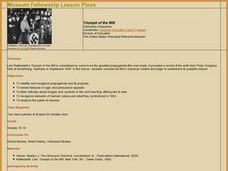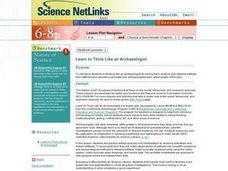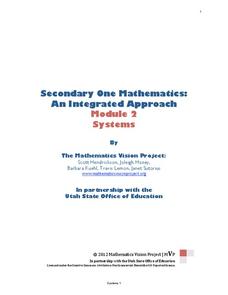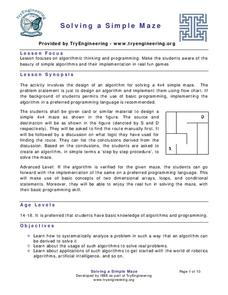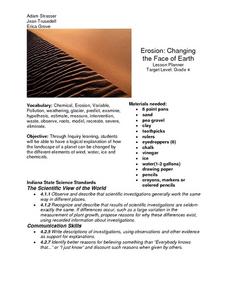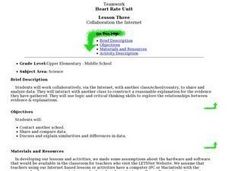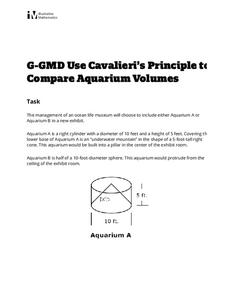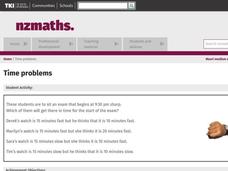Education Development Center
Language of Algebra
Don't rush into algebra, let learners visualize, guess, and predict their way to a successful math career. The introductory unit incorporates beginner algebraic concepts with shapes instead of variables. Young mathematicians use a...
K20 LEARN
To Ban or Not to Ban? Intellectual Rights and Responsibilities: Banned Books, Censorship Part 2
After examining different perspectives on book banning, scholars select a book from a list of frequently banned books and research the controversies surrounding it. They then craft an argument about their chosen book, including arguments...
Curated OER
Triumph of the Will
Students view the propaganda film, "Triumph of the Will". Identifying propaganda techniques used, they review any fallacies in logic or persuasive appeals. They discover elements in German culture and their meaning in 1934. They...
Curated OER
Leaarn to Think Like an Archaeologist
Students examine how to act as archaeologists by examining artifacts. The inquiry is meant to teach learners about analysis of ancient civilizations and scientific finds. Fossil evidence is also covered to make connection to the...
Inside Mathematics
Quadratic (2006)
Most problems can be solved using more than one method. A worksheet includes just nine questions but many more ways to solve each. Scholars must graph, solve, and justify quadratic problems.
Mathematics Vision Project
Module 2: Systems of Equations and Inequalities
The brother-sister pair Carlos and Clarita need your class's help in developing their new pet sitting business. Through a variety of scenarios and concerns presented to the siblings, the learners thoroughly explore systems of equations...
Mathematics Vision Project
Module 1: Getting Ready Module
This fabulous resource is a must-have for any algebra teacher's arsenal of lessons. Developing the idea of equations and use of variables from basic physical scenarios, learners gain valuable intuition in the structure and meaning of...
Polk Bros Foundation
Common Core Constructed Response Organizer
Get your writers ready to compose a constructed response essay in response to either an informational or fictional text. Pupils note down the big idea they wish to address as well as up to nine examples from the text that they wish to...
Computer Science Unplugged
Battleships—Searching Algorithms
How does a computer perform a search in order to find data? The lesson begins with a demonstration on finding one number out of 15. Pairs then play three games of Battleship by using different search techniques. The lesson plan finishes...
TryEngineering
Solving a Simple Maze
Solve a maze ... from a robot's point of view. In the lesson, your scholars build a small, simple maze from cardboard and then find a route from the start point to the finish point. They write an algorithmic process that a robot could...
University of North Carolina
Argument
What elements make up a successful argument? A helpful resource describes aspects of an argument such as the claim, evidence, counterargument, and audience. Perfect as an individual assignment for a flipped lesson or collaborative work,...
K20 LEARN
Trigger Warnings - Intellectual Rights and Responsibilities: Banned Books, Censorship Part 1
"Warning: Conducting this lesson may be harmful." Such statements, called "Trigger Warnings," are the focus of a two-part lesson that looks at censorship, especially the pros and cons of trigger warnings. Class members read two articles,...
Curated OER
Little Pigs with Big Problems
First graders solve one problem per day regarding the story of Three Little Pigs. In this math journals lesson plan, 1st graders solve problems on a daily basis using the story of the Three Little Pigs.
Curated OER
Questions/Inferring
In this literature worksheet, students will analyze a story and prepare the chart by completing the two columns entitled "I wonder" and "I think" in accordance with a particular passage or piece of literature. Students will use...
Curated OER
Introducing Temperature Measurement
Students explore temperature and use Celcius thermometers to measure and graph the temperature in the classroom daily. They estimate what they think the temperature might be and then find the actual temperature in the room.
Curated OER
Erosion: Changing the Face of Earth
Fourth graders explore how the landscape of the planet can be changed by different elements of wind, water, ice and chemicals through hands-on activities. They examine pictures of areas around town and discuss anything they think is out...
Curated OER
Collaboration the Internet
Students work collaboratively, via the Internet, with another class/school/country, to share and analyze data. They nteract with another class to construct a reasonable explanation for the evidence they have gathered.
Curated OER
The Underground Railroad
Third graders explore two different websites about the Underground Railroad. They make a graphic organizer to categorize the reasons a person might have for and against helping slaves escape on the Underground Railroad. They incorporate...
Illustrative Mathematics
Use Cavalieri’s Principle to Compare Aquarium Volumes
Learners are designing a stunning new water feature for an aquarium, but they soon discover that more than just a pretty home for their fishy friends is required. From calculating the volume of a composite shape through the abstract...
Curated OER
Adam's Watch
Third graders use their watches to tell the time while the teacher lists their responses on the board along with the reasons for them (set incorrectly, gain/lose time). They solve the problem in pairs and focus their thinking on the...
Curated OER
Who Plays What?
Ninth graders divide in pairs 3 cards with the words possible, impossible and certain on them. Ask questions of the class and get the students to hold up the word that describes the event (for example) Tomorrow it will snow. You have...
Curated OER
Time Problems
Students make sensible estimates and check for reasonable results. They also solve problems with positive and negative integers using practical activities or models as needed.
Curated OER
That's Not Fair
Fourth graders in pairs, go to the front of the class, where one student is given five pieces of candy in one hand and four in the other. The other student is given four candies in one hand and none in the other. They discuss if they...
Curated OER
The Diagonal Of A Box
Students solve problems using the pythagorean theorem. They use critical thinking skills in order to use a systematic process to solve the problem. Upon solving each problem the uniqueness of the lesson is asking students to give an...




